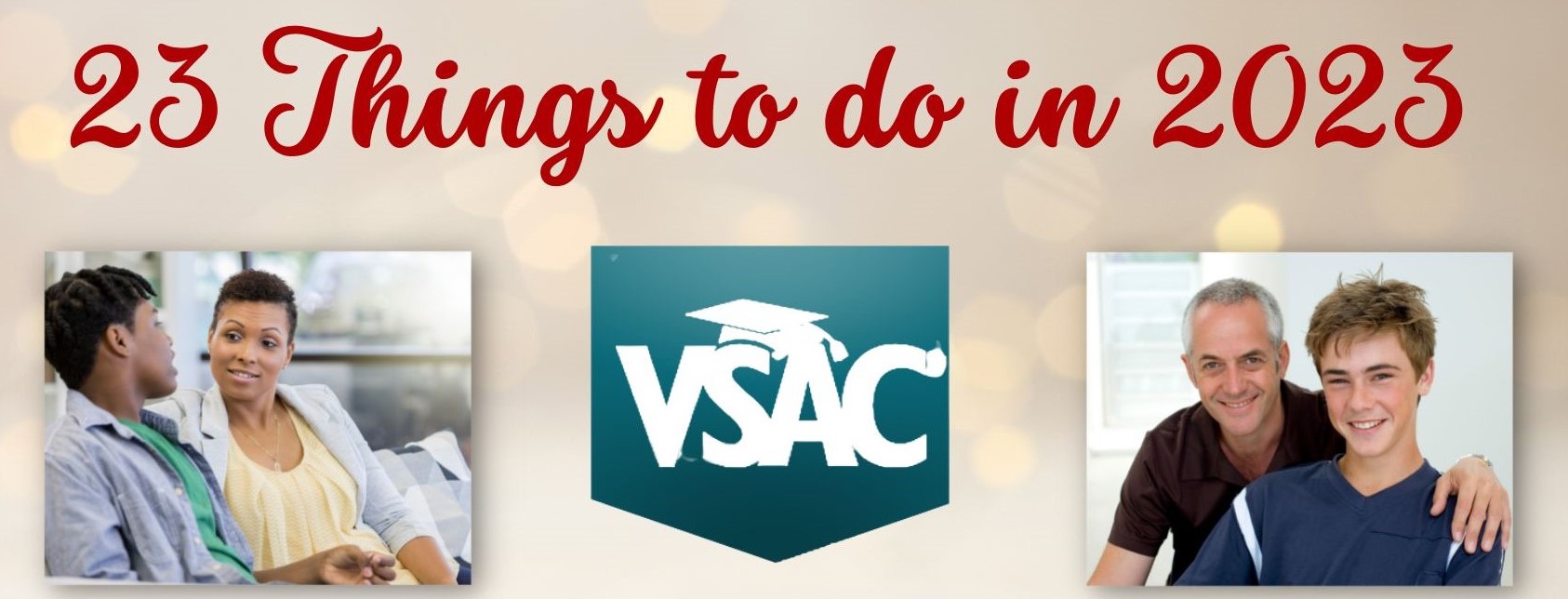23 Things to Do in 2023
Simple Steps Can Make the Difference in Student Success

WINOOSKI, Vt. -- When counselors at Vermont Student Assistance Corp. (VSAC) speak with students who have successfully completed high school and achieved their first early-adulthood goals – be it college admission, starting a technical program, or starting a job – there is usually one common denominator: adults who shared their expectations, their encouragement, and their advice.
So, as we turn to 2023, VSAC offers this list of 23 “resolutions” for parents of middle and high school students. Keep in mind: it’s impossible to be a perfect parent and to do everything on this list. But the good news is, in our experience, there are some very simple things that parents can do that make a big difference for their students in the long run.
- Support your student by providing proper nutrition and a good night’s sleep.
- Attend school events, especially parent-teacher conferences. Meet your student’s teachers and school counselor.
- Get to know the resources offered by the school counseling office.
- Make sure your student has a good place to study and that homework gets done.
- Help your student organize schoolwork, observe deadlines, and set priorities among their assignments.
- Talk to your student about good study habits, such as sitting in the front of the classroom, participating in discussion, asking questions, and submitting assignments before they’re due.
- Observe your student at home as they complete an assignment or prepare for a test, or ask them to show you their methods. You may be able to make suggestions that can improve their study skills.
- Have conversations about your student’s personality, likes and dislikes, non-academic concerns, and joys.
- Introduce your student to people who have careers or jobs that they’re interested in.
- Talk to friends, family members, co-workers, and/or the school counseling office about setting up a job shadow for your student.
- Take an active role in helping your student choose classes and extracurriculars that align with their interests and prepare them for their career and college goals.
- Help your student find meaningful summer activities, such as programs on college campuses, summer camps, paid work, and volunteer opportunities.
- Visit a college or tech-center campus, even if it’s an unofficial visit, such as for a sports event or a performance. Middle school students often do better in school when they realize that college can be a goal.
- Attend a college or career fair with your student, such as VSAC’s springtime College and Career Pathways event, a free conference for sophomores, juniors, and parents.
- For high school students, ask the school counseling office how your student should register for standardized tests, such as the SAT, ACT, TOEFL, or Accuplacer. (For these tests, registration typically takes place in the spring).
- For middle school students, inquire about practice standardized tests, such as the PSAT or PreACT, which typically accept registrations in the fall.
- Have the college cost conversation with your child early. Use net price calculators at College Scorecard to estimate what college might cost.
- Learn about financial aid. Consider attending a “Financial Aid and Managing College Costs” presentation at your school in the spring or view it online at www.vsac.org/financial-aid-videos.
- It’s never too late to open a 529 college savings account. You can start with $25, and funds can be used to pay back student loans. Visit www.vsac.org/save.
- Talk with your student about the application process for college or technical programs. To learn what’s involved, visit www.vsac.org/plan/applying-to-college.
- Help your student obtain college application materials.
- Keep copies of everything, including college applications, financial aid applications, and tax returns.
- If you have a student in a tech center program, remind your student to talk to their school counselor about the credential they can receive from their program and how to get it.
You can find more information about all these topics at VSAC’s website, www.vsac.org. It also offers to-do lists for parents and students that are based on the student’s grade.
Whatever “to-dos” you put on your own list; the most important thing is your involvement. It shows your student that you’re interested and that you believe in them.


